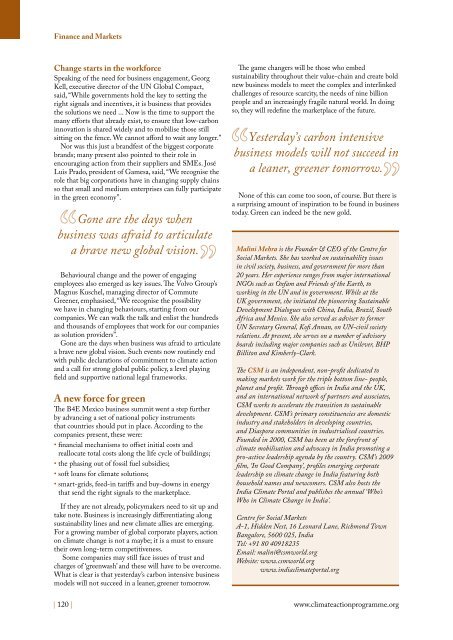Climate Action 2010-2011
Create successful ePaper yourself
Turn your PDF publications into a flip-book with our unique Google optimized e-Paper software.
Finance and Markets<br />
Change starts in the workforce<br />
Speaking of the need for business engagement, Georg<br />
Kell, executive director of the UN Global Compact,<br />
said, “While governments hold the key to setting the<br />
right signals and incentives, it is business that provides<br />
the solutions we need ... Now is the time to support the<br />
many efforts that already exist, to ensure that low-carbon<br />
innovation is shared widely and to mobilise those still<br />
sitting on the fence. We cannot afford to wait any longer.”<br />
Nor was this just a brandfest of the biggest corporate<br />
brands; many present also pointed to their role in<br />
encouraging action from their suppliers and SMEs. José<br />
Luis Prado, president of Gamesa, said, “We recognise the<br />
role that big corporations have in changing supply chains<br />
so that small and medium enterprises can fully participate<br />
in the green economy”.<br />
Gone are the days when<br />
business was afraid to articulate<br />
a brave new global vision.<br />
Behavioural change and the power of engaging<br />
employees also emerged as key issues. The Volvo Group’s<br />
Magnus Kuschel, managing director of Commute<br />
Greener, emphasised, “We recognise the possibility<br />
we have in changing behaviours, starting from our<br />
companies. We can walk the talk and enlist the hundreds<br />
and thousands of employees that work for our companies<br />
as solution providers”.<br />
Gone are the days when business was afraid to articulate<br />
a brave new global vision. Such events now routinely end<br />
with public declarations of commitment to climate action<br />
and a call for strong global public policy, a level playing<br />
field and supportive national legal frameworks.<br />
A new force for green<br />
The B4E Mexico business summit went a step further<br />
by advancing a set of national policy instruments<br />
that countries should put in place. According to the<br />
companies present, these were:<br />
• financial mechanisms to offset initial costs and<br />
reallocate total costs along the life cycle of buildings;<br />
• the phasing out of fossil fuel subsidies;<br />
• soft loans for climate solutions;<br />
• smart-grids, feed-in tariffs and buy-downs in energy<br />
that send the right signals to the marketplace.<br />
If they are not already, policymakers need to sit up and<br />
take note. Business is increasingly differentiating along<br />
sustainability lines and new climate allies are emerging.<br />
For a growing number of global corporate players, action<br />
on climate change is not a maybe; it is a must to ensure<br />
their own long-term competitiveness.<br />
Some companies may still face issues of trust and<br />
charges of ‘greenwash’ and these will have to be overcome.<br />
What is clear is that yesterday’s carbon intensive business<br />
models will not succeed in a leaner, greener tomorrow.<br />
| 120 |<br />
The game changers will be those who embed<br />
sustainability throughout their value-chain and create bold<br />
new business models to meet the complex and interlinked<br />
challenges of resource scarcity, the needs of nine billion<br />
people and an increasingly fragile natural world. In doing<br />
so, they will redefine the marketplace of the future.<br />
Yesterday’s carbon intensive<br />
business models will not succeed in<br />
a leaner, greener tomorrow.<br />
None of this can come too soon, of course. But there is<br />
a surprising amount of inspiration to be found in business<br />
today. Green can indeed be the new gold.<br />
Malini Mehra is the Founder & CEO of the Centre for<br />
Social Markets. She has worked on sustainability issues<br />
in civil society, business, and government for more than<br />
20 years. Her experience ranges from major international<br />
NGOs such as Oxfam and Friends of the Earth, to<br />
working in the UN and in government. While at the<br />
UK government, she initiated the pioneering Sustainable<br />
Development Dialogues with China, India, Brazil, South<br />
Africa and Mexico. She also served as adviser to former<br />
UN Secretary General, Kofi Annan, on UN-civil society<br />
relations. At present, she serves on a number of advisory<br />
boards including major companies such as Unilever, BHP<br />
Billiton and Kimberly-Clark.<br />
The CSM is an independent, non-profit dedicated to<br />
making markets work for the triple bottom line- people,<br />
planet and profit. Through offices in India and the UK,<br />
and an international network of partners and associates,<br />
CSM works to accelerate the transition to sustainable<br />
development. CSM’s primary constituencies are domestic<br />
industry and stakeholders in developing countries,<br />
and Diaspora communities in industrialised countries.<br />
Founded in 2000, CSM has been at the forefront of<br />
climate mobilisation and advocacy in India promoting a<br />
pro-active leadership agenda by the country. CSM’s 2009<br />
film, ‘In Good Company’, profiles emerging corporate<br />
leadership on climate change in India featuring both<br />
household names and newcomers. CSM also hosts the<br />
India <strong>Climate</strong> Portal and publishes the annual ‘Who’s<br />
Who in <strong>Climate</strong> Change in India’.<br />
Centre for Social Markets<br />
A-1, Hidden Nest, 16 Leonard Lane, Richmond Town<br />
Bangalore, 5600 025, India<br />
Tel: +91 80 40918235<br />
Email: malini@csmworld.org<br />
Website: www.csmworld.org<br />
www.indiaclimateportal.org<br />
www.climateactionprogramme.org












